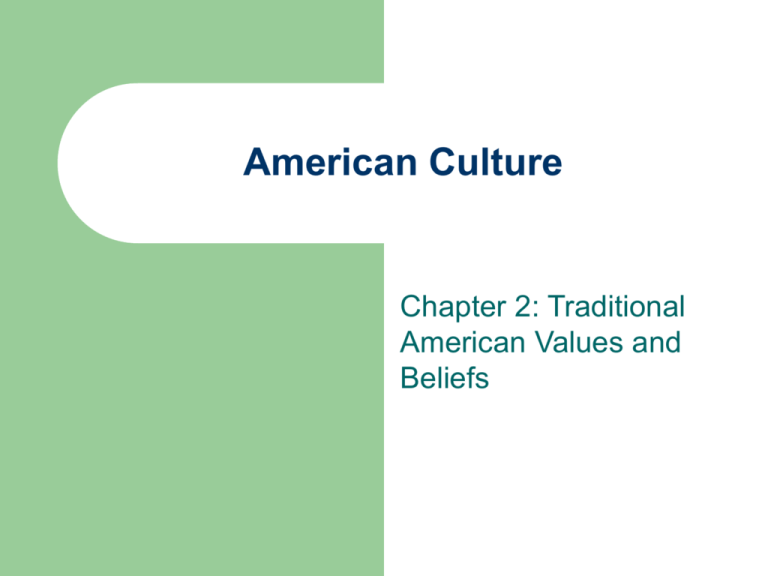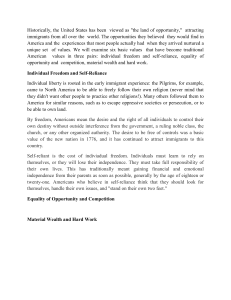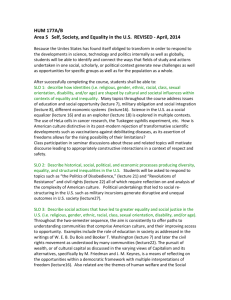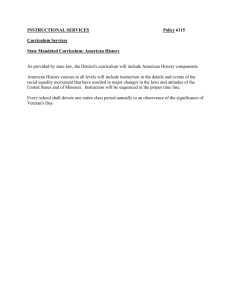Chapter 2
advertisement

American Culture Chapter 2: Traditional American Values and Beliefs The Context of Traditional American Values: Racial, Ethnic, Religious, and Cultural Diversity Today, the US is the most diverse country in the world Racially, ethnically, culturally, religously The US has always had some diversity Native Americans Spanish settlers French missionaries Black slaves British colonists The Context of Traditional American Values: Racial, Ethnic, Religious, and Cultural Diversity Diversity = Pluralism (more than one) The high diversity in the US meant that people had no choice but to accept it Many Americans see their diversity as their strength Pluralism is recognized more today than it was in the past The Context of Traditional American Values: Racial, Ethnic, Religious, and Cultural Diversity Question: How did the American national identity develop with so much diversity? The Context of Traditional American Values: Racial, Ethnic, Religious, and Cultural Diversity Answer:??? “we share a common set of values that make us American…. We are defined by the rights we have…. Our rights are our history, why the first European settlers came here and why millions more have come here since.” – John Zogby The Context of Traditional American Values: Racial, Ethnic, Religious, and Cultural Diversity “The land of opportunity” The values of the people who went to America for a new life developed into the traditional values of American today: – – – – – – Individual freedom Equality of opportunity Material wealth Self-reliance Competition Hard work Individual Freedom and Self-Reliance Early colonists came to America to escape oppression at home (Europe) by kings, governments, churches etc British colonists declared independence in 1776 In 1789 the constitution was written which separated church from state Titles (Lord, Duke, Sir) were forbidden to prevent an aristocratic society from developing Individual Freedom and Self-Reliance This created a “climate of freedom” where the individual was most important. Individual freedom (i.e. you can do anything you want to do) is the most basic American value. Individual Freedom and Self-Reliance Freedom: the desire and the right of all individuals to control their own destiny without outside interference from the government, a ruling noble class, the church, or any other organized authority. This “freedom” has attracted many immigrants to America Individual Freedom and Self-Reliance However, to achieve “individual freedom” they needed to be “self-reliant” – Financial / emotional independence from parents Americans believe they should take care of themselves and solve their own problems They owe nothing to any man, they expect nothing from any man; they acquire the habit of always considering themselves as standing alone, and they are apt to imagine that their whole destiny is in their own hands. -Tocqueville Individual Freedom and Self-Reliance Most Americans believe they must be selfreliant to keep their individual freedom i.e. if you rely on someone else, you don’t have any freedom Individual Freedom and Self-Reliance Sometimes, people are forced to rely on others This is generally not a long term arrangement Being too reliant on others means a loss of freedom, and sometimes a loss of respect Even when dependent on others, people must ‘appear’ to be self reliant Individual Freedom and Self-Reliance Financial support (charities, welfare) to those in need is generally for a short time only It is expected that people will take care of themselves Financial support is common, but not admired Many believe it is a bad example that will weaken the American character. Equality of Opportunity and Competition Immigrants to the US believe that everyone has the chance to succeed People are free from excessive political, religious, and social control One reason is the lack of a hereditary aristocracy Equality of Opportunity and Competition No formal class system exists in the US Many people believed that in their native countries, their social class would determine how successful they could be In America, they would not have to compete with rich and powerful noble families Equality of Opportunity and Competition Many immigrants were very successful in the US – regardless of their background This lead to the idea of equality of opportunity The more I advanced in the study of American society, the more I perceived that … equality of condition id the fundamental fact from which all others seem to be derived. -Tocqueville Equality of Opportunity and Competition “Equality of opportunity” – Each individual has an equal opportunity for success “Success” is the main goal of American life – everyone should have the same chance to be successful An “ethical” rule (similar to “fair play”) Equality of Opportunity and Competition We… wish to allow the humblest man an equal chance to get rich with everybody else. When one starts poor, as most do in the race of life, free society is such that he knows he can better his condition; he knows that there is no fixed condition of labor for his whole life. -Abraham Lincoln Equality of Opportunity and Competition The downside of equality of opportunity is competition Americans see life as a race to succeed – with winners and losers Americans believe that since they all have the same opportunity to succeed, they have a duty to try Equality of Opportunity and Competition Pressure of competition is part of all Americans’ lives Competition is encouraged at an early age (especially in sports) Equality of Opportunity and Competition Americans are under a lot of pressure to compete throughout their working lives When they retire, many lose their prestige and respect People who don’t compete well are seen as misfits Material Wealth and Hard Work People came to the US to raise their standard of living America has very abundant natural resources – and was seen as a “land of plenty” Many improved their own lives or the lives of their children Material wealth became important to Americans Material Wealth and Hard Work “Materialism” – to place a high value on material possessions (cars, jewelry, etc) Americans are perceived to be very materialistic – even though they may value other things more highly (family, faith etc) Why are Americans materialistic? Material Wealth and Hard Work Answer: Material wealth dictates social status in the absence of hereditary aristocracy or titles of nobility. Quality and quantity of possessions became a measure of success. Material Wealth and Hard Work However, to achieve material wealth Americans must work hard It took a lot of hard work to develop and profit from the abundant natural resources of the US. Material possessions were seen as a natural reward for hard work, and as an indicator of someone’s ability Material Wealth and Hard Work Today, it is more difficult for an average American to become very wealthy because of changes in the economy To compete internationally, many people must now work longer for less They have become the “working poor” workers with a low standard of living Material Wealth and Hard Work Most Americans still value hard work, but it is becoming more common for people to receive welfare Families are limited to how much welfare they can receive Many employers no longer provide benefits (health insurance etc) to their workers The American Dream The behavior and values have remained constant: Americans still love their country and believe that they can accomplish almost anything. A recent poll found 91 percent who agreed with the statement, “Being an American is a big part of who I am.” Only 11 percent said they would like to emigrate elsewhere…. Frenchman Clotaire Rapaille captured this unique aspect of American patriotism: “America is not a place. It is a dream.”







